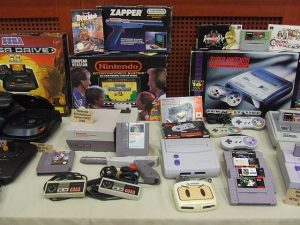Digital vs Physical Games

Digital VS Physical Games: A Collector’s Perspective
As a real lover of video games, and also a hardcore video game collector, I sometimes find myself in a dilemma when deciding if I am going to pick up a game. The reason I have these troubles is because these days a lot of games, especially games from indie developers, are only sold in a digital format. This has caused me to sometimes think twice about buying a game that normally I would have no problem getting. I have wrote this to help explain my problem, and hopefully help some of you who may be going through the same sort of issues. So put your wallet away and sit back and let’s go over the pros and cons of buying digital vs physical games.

What’s Wrong With Digital Games?
While some of you may already be aware of the issues many people have with buying digital games, some may not, so let’s explain what the problem is and why many people think this way. So my first problem with buying digital games is that you can not sell a digital game after you buy it. This means that if you buy a game and don’t like it, then you can’t simply sell it back and at least get some of your money back. This also means that if the game becomes rare and valuable in the future you will be stuck with it and be unable to sell it and cash in on your investment. While most games do not become rare and valuable, it is still nice to be able to resell something if you spent your hard earned cash to get it in the first place.
My second problem with buying digital games is that if for some reason the online service you bought the game from, or that company itself ever goes out of business, you may not be able to re-download the game you purchased. This means that if your console ever dies and is either not repairable, or very expensive to repair, you will be out of luck and unable to get that game you paid for. There is also the issue of sometimes not being able to transfer a digital game from one console generation to the next, much like what we have seen with many Nintendo consoles in recent years.
This also brings up another issue that as a historian I have thought about many times, and that is game preservation. If it is the case that games that are only made in a digital format could be lost if a company goes out of business, this means that a game could be lost from history and become impossible to play in the future. As a historian this thought is a very serious one for me and it is something that has kept me up at night.
The final reason I have a problem with games that are only available in a digital format has to do with the price of the game itself. When you buy a game in a store such as Walmart, Gamestop, or Best Buy you are getting a physical thing that includes a disc, a box, and sometimes a manual. When you buy a digital game you are only getting a “rom” or “disc image” of that game and you do not physically get anything. Now I would be ok with this if the digital version of the game was cheaper in order to make up for those lost physical items, but the opposite is usually the case.
From my experience video games that appear on a digital store such as the Nintendo eshop rarely have price drops, and if they do they are usually done a long time after the game is released. When a game has a physical version that version will appear in game stores with prices that represent the real market value of that item. In this day and age websites and services such as eBay and the Amazon marketplace exist, where people can buy and sell their items and have real people bid on them. These sites usually show what the real value of an item is, and show what real people are willing to pay for them. These sites also cause stores such as Gamestop to adjust their prices, on both new and used games, in order to be at least somewhat competitive with eBay and Amazon. What all of this means is at the end of the day a digital game is usually more expensive on an online store, and cheaper in a physical brick and mortar store.

Why Would You Want a Digital Game?
While buying digital games has many drawbacks, there are a few reasons why it could sometimes be a good idea to skip on the physical version of a game.
The first reason why buying a digital game is something the better way to go, is that it is sometimes the ONLY way to go. Like I mentioned earlier, many games these days are only sold in a digital format. This means that there are many really good games that you can only ever play if you are willing to get that digital version of it. Think about a game like Blaster Master Zero, a REALLY good game, that you can only play if you buy it digitally. Fortunately this game is only $10, which makes it much easier to pull the trigger.
The second reason why buying a digital game is a good choice sometimes is that certain games, especially older games, are a lot cheaper than their physical versions. Think about a game like Chrono Trigger, or Earthbound, both games that are really expensive in their physical versions. A digital version of these games usually wont run you more than $10, while their physical counterparts are over $100. In these cases if you are not a seriously collector, or even if you are and you do not want to get your game damaged during play, than I can completely understand why someone would rather get the digital version.
Another instance of digital games being better than their physical counterparts is that the digital versions sometimes have faster load times. These differences become apparent in specific games such as Xenoblade Chronicles X for the Nintendo Wii U. This game runs significantly faster in its digital version, and therefore is probably just better to get it in this format. Also many games these days require day 1 patches to play without game breaking bugs. While the problem of online services going offline is still an issue, just getting an already patched digital version of a game could just be more convenient for the consumer.
So When Should You Buy a Digital Game?
So you may now be thinking which do I do? Do I get the digital version? Or do I go out to the store and get the physical version? Well, what I would suggest is that if a game is available both digitally and physically, then get the physical version. You will be able to resell it, trade it, and potentially keep it forever. You are also getting more bang for your buck as you are also receiving the disc, box, and potentially a manual. If a game is only available digitally, then think really hard if you truly want to play that game, and also keep the price of that game in mind.
So did this breakdown help you at all? Do you now think differently about buying digital games? Let us know in the comment section below, as we would love to hear from you!
